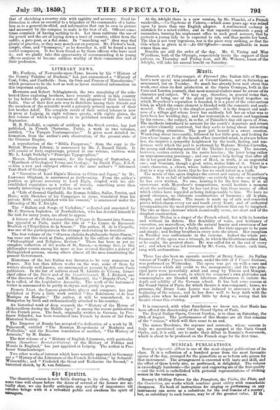Rusk
Ihnorah, or Ii Pelkgrinaggio di Ploirmel (the Italian title of Meyer. beer's new opera) was produced at Covent Garden, not on Saturday as announced, but on Tuesday. So much has already been said about this work, ever since its first production at the Opera Comique, both in the Paris and Lcaidon journals, that most musical readers must be aware of its character and subject. We may say, therefore, in general terms that, instead of being one of the grand and imposing lyrical tragedies on which Meyerbeees reputation is founded, it is a piece of the semi-serious kind, in which the comic element is blended with the romantic and senti- mental. The subject is the simplest possible : it is the despair and mad- ness of a village girl whose lover has suddenly left her on what was to have been her wedding day, and her restoration to reason and happiness by his return ; the subject, in so far, of Paisiello's fine old opera of Nina. The incidents introduced to account for the youth's departure and return are rather clumsily contrived, but they serve to bring about interesting and affecting situations. The poor girl herself is a sweet creation. Wandering about incessantly, followed by her little goat, and looking for him whose image, in all the moods of her unsettled mind, is always before her, she inspires a sympathy heightened by the truth, feeling, and ten- derness with which the part is performed by Madame Miolan-Carvalho, the young and charming actress: of the Theatre Lyrique. The interest, however, centres entirely in the rustic heroine ; the lover being rather an unprepossessing personage; and one cannot help feeling that after all she is too good for him. The part of Hod, in truth, is an ungrateful one ; and Graziani, though a good actor, makes little of it. There is a comic character, a clown, whose ludicrous poltroonery is acted by Gar- doni in a way which shows that he has no small talent as a buffo. The music of this opera displays the extent and variety of Meyerbeees genius. It is as full of individuality—as entirely his own—as anything he has ever written. No one, hearing it for the first time, if at all conversant with Meyerbeees compositions, would hesitate a moment about the authorship. But he has cast from him those means of effect which critics have regarded as being indispensable to him. We have no grand choruses, no elaborate combinations of harmony ; all is plain, simple, and melodious. The music is made up of airs and concerted pieces which charm every ear and touch every heart, and of orchestral accompaniments the most picturesque and delicious that can be imagined. The two or three choruses which occasionally occur, are short and of the simplest construction.
Madame Miolan is a singer of the French school, but with its beauties and without its defects. Her flexibility of voice, and brilliancy of execution, are marvellous, while the natural beauty and sweetness of her voice are not impaired by a faulty method. Her taste appears to be pure and simple ; and feeling breathes in every note she utters. Her reception on Tuesday was enthusiastic in the extreme. Indeed the whole per- formance of the opera was a triumph, in which the illustrious author had, as he ought, the greatest share. He was called for at the end of every act ; and when he was led forward by Mr. Costa, the house, each time, rang with acclamations.


























 Previous page
Previous page